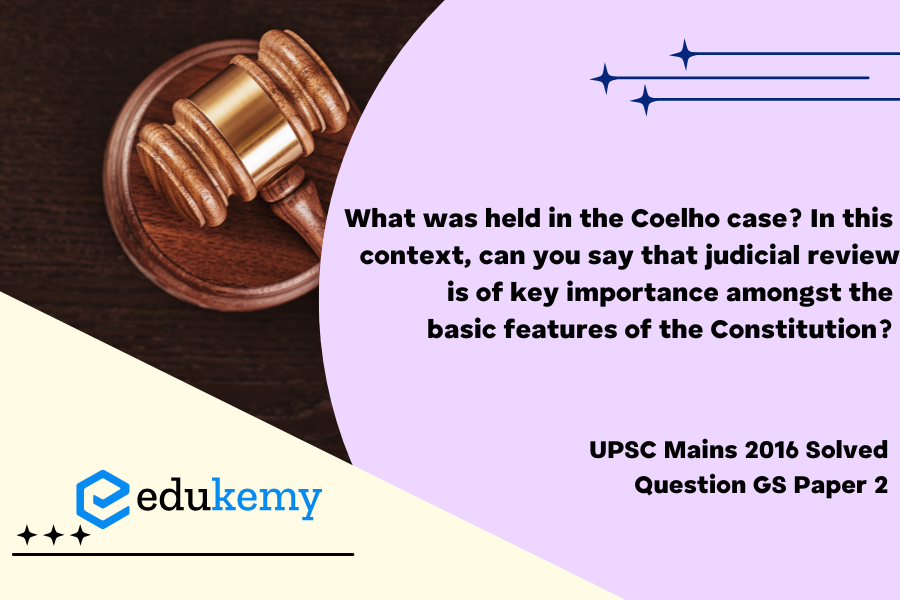The Coelho case, also known as I.R. Coelho v. State of Tamil Nadu, marked a pivotal moment in Indian constitutional jurisprudence. The case centered around the constitutional validity of the 93rd Amendment to the Constitution, which introduced Article 15(5) and Article 21-A, aiming to provide reservations in educational institutions and government jobs for socially and educationally backward classes. The fundamental question before the Supreme Court was whether such amendments violated the basic structure doctrine, a judicially evolved concept that identifies certain essential features of the Constitution beyond the amending power of the legislature. The Coelho case is noteworthy for reaffirming the doctrine of basic structure, holding that amendments altering or affecting its core features could be subjected to judicial review.
This case underscores the significance of judicial review as a cornerstone among the basic features of the Indian Constitution. Judicial review empowers the judiciary to assess the constitutionality of legislative and executive actions, ensuring that they conform to the foundational principles of the Constitution. In Coelho, the Supreme Court played a crucial role in upholding the sanctity of the basic structure, asserting that even constitutional amendments were subject to scrutiny when they threatened the foundational values and principles enshrined in the Constitution. The Coelho case thus reinforces the notion that judicial review acts as a bulwark, safeguarding the integrity of the Constitution and preserving its core features against encroachments by other branches of government.
Tag: Structure, organization, and functioning of the Executive and the Judiciary—Ministries and Departments of the Government.
Contents
Decoding the Question:
- In the Introduction, briefly write about the I R Coelho case.
- In Body,
- Discuss what judicial review is and mention its importance.
- Second, discuss the role of judicial review and whether judicial review is a part of basic features of the Constitution or not.
- In Conclusion, try to end with the significance of judicial review.
Answer:
Coelho case is one of the landmark judgments on the interpretation of the doctrine of the basic structure of the constitution as laid down in the Kesavananda Bharati case. The politico-legal controversy continuing for decades has been brought to an end by this judgment, holding that Parliament amending power subject to Judicial Review.

The I R Coelho v. State of Tamil Nadu case, 2007:
- R Coelho case is the latest of the landmark judgments on the interpretation of the doctrine of the basic structure of the constitution as laid down in the Kesavananda Bharati case.
- The Coelho case popularly known as the Ninth Schedule case was an important judgment that upheld the basic structure doctrine propounded earlier in the Kesavananda Bharati case.
- It was held in the Coelho case that ninth schedule items are not immune to judicial review as it is part of the constitution. Furthermore, no item in the ninth schedule can abrogate fundamental rights as they form basic features of the constitution
- Enactment of the 9th schedule provided a means for the Legislature to evade judicial scrutiny but the judgment in this case, restored the balance between the three organs, and hence, judicial review forms a key feature of the basic structure of the constitution.
Judicial Review and its Importance:
- Article 13 (2) and Article 32 provide for the judicial review to ensure and protect Fundamental Rights, which are guaranteed in Part III of the Constitution.
- Dr. B.R. Ambedkar, who chaired the Draft Committee of the Indian Constituent Assembly, had characterized the judicial review as the ‘heart of the Constitution’.
- Article 13(2) of the Constitution of India prescribes that “the Union or the States shall not make any law that takes away or abridges any of the fundamental rights, and any law made in contravention of the aforementioned mandate shall, to the extent of the contravention, be void”.
- The role of the Judicial Review in the Indian Constitution is to protect/provide liberty and freedom to the people. It is a useful weapon for equality, liberty, and freedom.
- It also establishes fairness in administrative action and rules on questions of Legislative competence between the Centre and the States. It maintains the balance of federalism.
- It also ensures the supremacy of the Constitution against the breach of power by the legislature and executive.
- The Supreme Court considerably widened the scope of judicial review in India through its judgment in Maneka Gandhi’s case. It accepted the concept of natural justice as one essential component of the law, thereby importing the American concept of ‘due process of law’ into our Constitution.
- The Constitutional bench in Indira Nehru Gandhi v. Raj Narain held that Judicial Review in election disputes was not a compulsion as it is not a part of the basic structure.
- In other such subsequent judgments, SC added various provisions of the Constitutions in the list of Basic structures.
Therefore, judicial review is a crucial aspect and cornerstone of our constitutional setup. However necessary care should be taken to ensure that judicial review doesn’t lead to judicial overreach which is harmful for a democratic set up like India.
In case you still have your doubts, contact us on 9811333901.
For UPSC Prelims Resources, Click here
For Daily Updates and Study Material:
Join our Telegram Channel – Edukemy for IAS
- 1. Learn through Videos – here
- 2. Be Exam Ready by Practicing Daily MCQs – here
- 3. Daily Newsletter – Get all your Current Affairs Covered – here
- 4. Mains Answer Writing Practice – here


